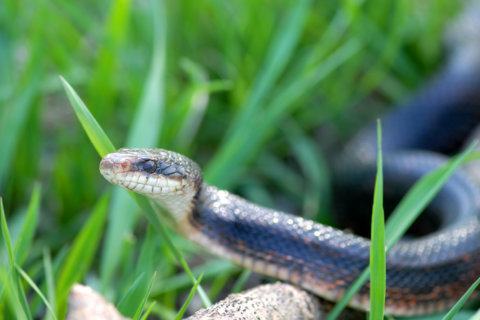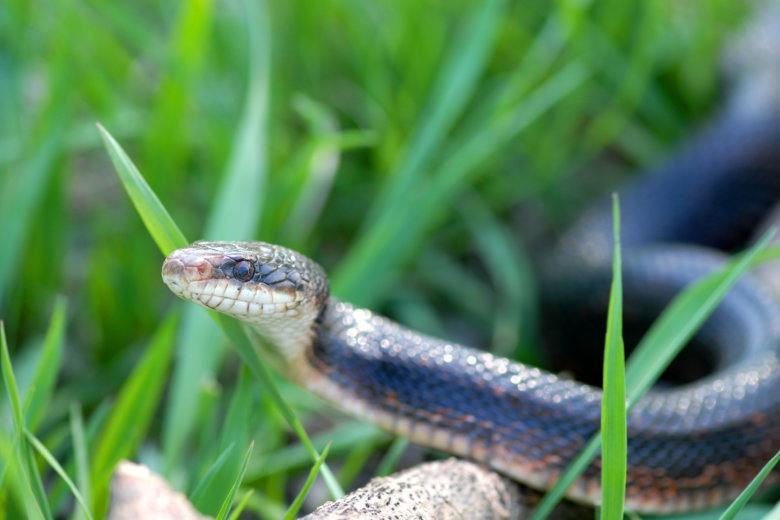
Snakes in the place!
Shawn writes:
“My family (including a puppy) moved into my dream house a year ago in
Haymarket. The backyard is gorgeous and backs up to woods. Three months ago I saw a 4-foot-long snake. Last month we discovered seven snake skins and found three rat snakes underneath a bed of mulch. I am worried that our pup might sniff or dig back there on the wrong day. We have not planted anything back there yet but I’m wondering if we should get rid of the mulch and just pave it over? Or are there things we can plant out there to repel the snakes?”
Snakes: Plants versus pavers
First, relax. That many snakes being visible means that there’s lots of food for them, specifically mice, rats and voles moving in from those woods. Get rid of the snakes and you’ll have real problems.
Now, are there plants that will repel snakes? Yes, a lawn. Snakes like the cover, prey and moisture that tall bushy plants provide and avoid open areas like lawns where they could become prey.
Pavers? Snakes love them! The pavers heat up during the day and provide warmth for the snakes then and into the evening. Hey, at least they’ll be out in the open!
Snakes: My money is on the pup
I would not worry about the pup, Shawn. Rat snakes are among the least aggressive members of this greatly misunderstood family and are likely to turn tail and run — eh, slither — away when they encounter a dog or cat.
In fact, dogs are one of snakes’ biggest “natural” enemies.
I emailed Shawn to try and find out the pup’s breed and size but got no reply. But I can tell you that if there’s any kind of terrier mix in there, it’s the snakes that are in trouble.
In addition to being skittish, rat snakes can’t eat anything that’s more than about double their girth. I assume your pup is bigger than that — and again, the snakes are going to slither away from a barking dog of any size as fast as their little (whatever it is that snakes slither on) can carry them.
Evict the snakes and be prepared to welcome rats
Again, snakes this size are fierce predators of the rats and mice that are coming out of the woods and trying to get into your house before winter. Why do you think they’re called rat snakes? And they’ll eat your voles before those voles can eat your plants. Moles too. And the vermin must be there, or the snakes would not be there.
Again, snakes like damp, brushy areas and avoid open spaces like lawns. They do like to sun themselves on large rocks and paved patios, so keep that in mind as you landscape. And when your neighbors complain of mice in the house this winter, tell them you don’t have that problem because you have the original nontoxic exterminator on patrol.
Fogging for mosquitoes: Threat or menace?
Rocky in Annapolis writes:
“Hi Mike; I wanted to get your thoughts on government mosquito spraying. Here in Maryland, they spray Permethrin from trucks with what they say are “Ultra Low Volume” sprayers. Once a week, just after dusk, I have to make sure all the windows are shut, as I have a cat.”
Note from McGrath: Good thinking, Rocky. Cats are notoriously sensitive to all forms of pyrethrum-based products.
Rocky continues:
“Recently, the program has been accused of killing 1000s of butterflies. Also, I know that the number of fireflies declines quite a bit after spraying. I can opt out of this program, but if I do, I fear my neighbors might get upset. They would also probably find out since the state has a policy of notifying the neighborhood associations about anyone that opts out. Shouldn’t the state be using mosquito-specific larvicide instead of these broad-spectrum insecticides? And should I opt out of the permethrin spraying?”
The least effective form of mosquito control
Yes, Rocky. You should opt out, as should your neighbors. These indiscriminate spraying programs kill very few mosquitoes. In fact, the U.S. Centers for Disease Control and Prevention has been quoted as calling fogging, “the least effective method of mosquito control.”
And it’s not just butterflies, permethrin sprays kill many more beneficial insects than mosquitoes — including dragonflies, the number one natural predator of mosquitoes.
They could be spraying BTI instead
And, yes, Rocky. They should be spraying BTI instead. And we know it works!
BTI — the all-natural larvicide that prevents mosquitoes from successfully breeding — was tested by Rutgers in redesigned spray trucks and found to be remarkably effective. I interviewed one of the study’s authors, Dr. Dina Fonseca, a few years back and she explained that the spray made its way both to clogged gutters and other breeding sites up high as well as to standing water, wet plastic bags and tarps and such on the ground.
So come on Maryland, get out of the 19th century and into the 21st!
Wacky weather rundown and honey do and don’t list
Thanks to higher-than-normal temps:
- You still have time to seed a new lawn or over-seed bare spots. But don’t delay; the soil isn’t going to stay this warm forever. Hopefully.
- You still have time to aerate a cool-season lawn to reduce soil compaction. Just make sure the soil is dry or you’ll do more harm than good.
- And you still have time to plant garlic.
But this ain’t Phoenix, So …
- No pruning of any kind; no exceptions. You don’t want to stimulate new growth this late in the season.
- Don’t plant new Spring bulbs yet; wait until around Thanksgiving or they might sprout prematurely
- Do prepare house plants for coming back indoors by spraying them repeatedly with sharp streams of water. Same for pepper plants. If you’ll give them artificial light over the winter and they will become wonderful perennials. Pot them up, rinse them off repeatedly and keep them up close to a 4-foot-long shop light when you bring them inside.








